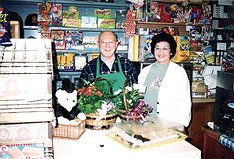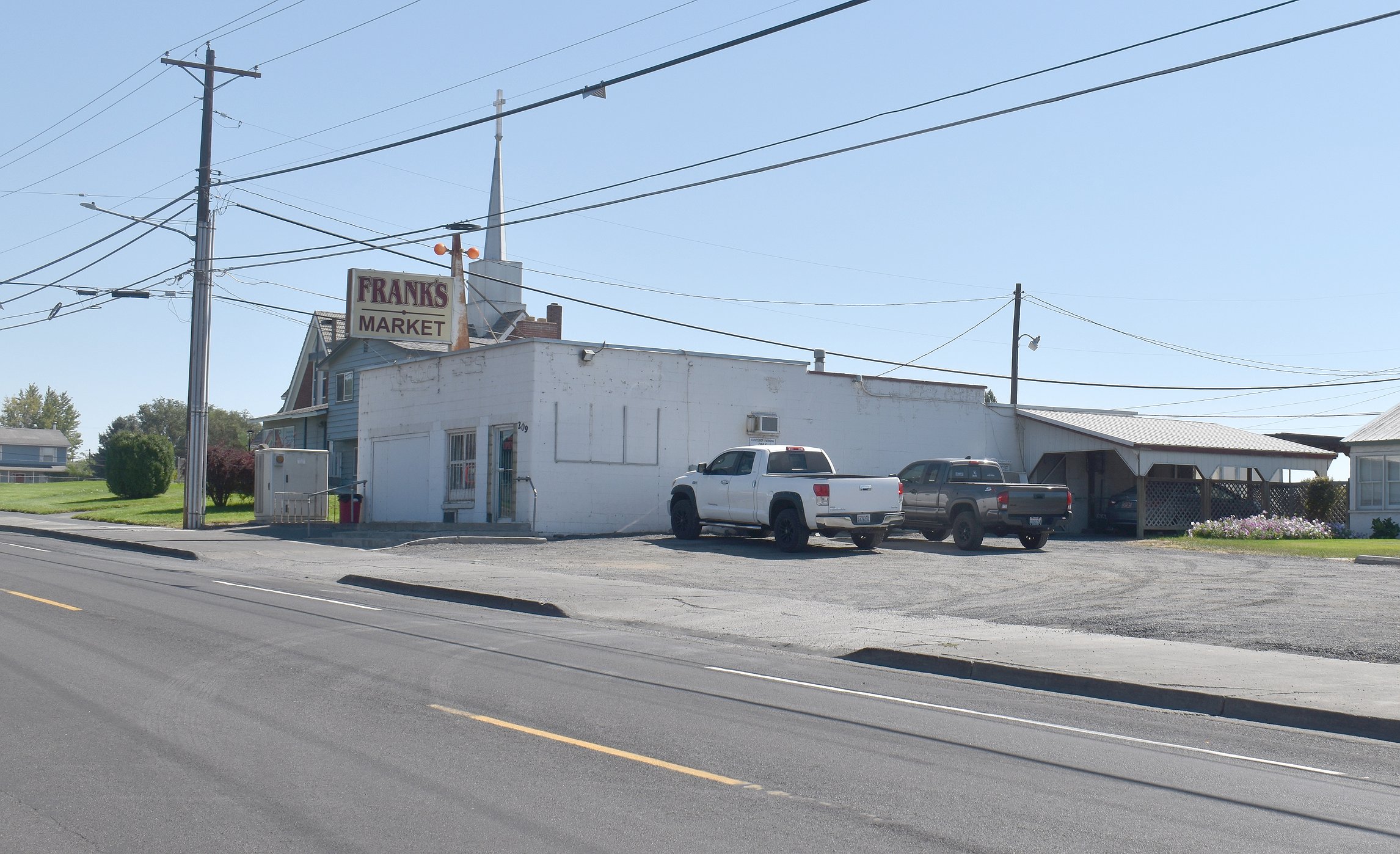Moses Lake icon turns 100
MOSES LAKE — Miyo Koba, owner of Frank’s Market for more than 70 years, turns 100 today.
“I think it’s (due to) hard work,” Koba said last week. “I think it’s just being busy and taking care of myself. I don’t smoke, I don’t drink. Just working hard.”
Frank’s Market, and its owners, hold a special place in the hearts of many lifelong Moses Lake residents. Miyo Koba and her husband, Frank Koba, bought the store in 1952, just as Moses Lake’s population was booming, and because it’s close to several schools, generations of Moses Lake children have stopped there for candy and pop.
“Miyo and Frank knew all of us kids for all our lives, from riding our bikes there at age 6 to get penny candies off the wall, up until moving back to town decades later,” wrote Barbara Black in a message to the Columbia Basin Herald. “She always recognized us and knew all our names.”
Growing up
Miyo Koba, nee Miyo Konishi, has seen a lot of change in her time. When she was born, it was illegal in Washington for Japanese farmers to own the land they worked on. Koba was one of eight children born on a farm near Toppenish.
“Our landowner was Indian,” she said. “The Toppenish area is Indian reservation, you know. So, we actually leased our farm from this Indian man, and he was very nice.”
Koba’s mother made a lot of traditional Japanese food, Koba said, and the children spoke Japanese at home until they went to school. Then, she said, they came home and taught their parents to speak English. And like farm kids everywhere, they spent a lot of time outdoors.
“We didn't have anything, so we made our own fun,” Koba said. “We'd run races out in the fields, and we played softball in the pastures. Then, my dad did buy me a tennis racket, because I loved to play tennis. I never really excelled in it, but that was the only thing that he could afford to get for me.”
A life interrupted
Koba attended school in Toppenish all through high school, and if it had been almost any other time in history, she would have walked through graduation with her class. But it was 1942, and people of Japanese ancestry were being rounded up across the western U.S. and moved inland.
“Because of the war, we were not allowed to participate in the commencement exercises,” she said. “My folks had to give up the farm and move. We moved it into a church, a Buddhist church in Toppenish, and waited there till we were told to leave.”
The Konishis were taken to an assembly center in Portland where they stayed, along with people from all over the Northwest, for about three months, she said. Then they were taken to the Heart Mountain War Relocation Center in Wyoming. Koba worked at growing sugar beets and went with her sister to work for a couple of months at a cannery in Utah, making $12 a month, a paltry sum even for the time.
“The Japanese people are not people that complain,” she said. “So, we just made do, and whatever we had to do, we did. I worked in camp for a little while. I taught some little kindergarten kids, and I was a nurse's aide at the hospital for a while.”
The Heart Mountain internment camp was closed in November 1945, according to government records. Koba’s sister and her husband had come to Moses Lake and the rest of the family came to visit, and eventually stayed in Moses Lake. There she met Frank Koba, from Bainbridge Island via the Manzanar, California and Minidoka, Idaho internment camps, whose family had a farm just down the road in Hiawatha Valley. The two married in Seattle in 1946, in a ceremony presided over by Rev. Emery Andrews, who had ministered to internees at the Minidoka camp, according to the Japanese Baptist Church of Seattle’s history.
“We went to Seattle, and things didn’t work out very good,” Koba said. “So, we came back, because our folks were here, and Frank worked at the Moses Lake Cash Store (now Walker’s Mattress) and we lived in one of these little cabins out here. Then in 1952, Mr. and Mrs. Salmon had this store here, and we were able to buy it from them. Things were a little tough then, and we had to borrow the money to buy it.”
Work and family
The store at 209 E. Nelson Road was renamed Frank’s Market, and it’s been that ever since. Frank ran the store seven days a week, while Miyo raised two sons and a daughter in the little house behind the store.
“I had a big job,” she said. “I did the yard work, did the housework and raised kids, and worked at the store. The store was Frank’s life. Spent all his time at the store and going to the ball games and supporting the high school kids.”
“Her yard and her house were all that it was to her,” her son, Rick Koba, said. “She said that was her baby and she worked that thing like crazy. She would come over and relieve Dad once in a while.”
Frank’s Market quickly became a staple in the neighborhood, a regular stop for the neighbors.
“My dad, Dr. George Black, was lifelong friends with Frank and Miyo and was at the store daily because they got him a Seattle newspaper every day,” Black wrote. “She would make coffee for the neighborhood guys to stop by and ‘chat’ and my mom would always wonder why it took Dad an hour to go get the paper.”
“Those were the days when they had the return on pop bottles,” Rick Koba said. “The kids would go running around and pick up those pop bottles and bring them in and Dad would give them change. Well, they didn't bother cleaning the pop bottles, so Dad would say, ‘The pop guys are coming, so you go back there, and you straighten them up and sort out the pop bottles.’ Oh, God, I didn't want to do that. After a while he knew, so he said, ‘Hey, you got a choice. You can either do that or you can go play ball with your buddies.’
Frank’s Market was open daily except on rare occasions like weddings, funerals and graduations. The only other exception was New Year’s Day, Miyo Koba said.
“In our early days, there was quite a few Japanese people here,” she said. “They settled here after the war. And Japanese, traditionally, we celebrate New Year’s. So (after getting) all the food, the fish and things, for the holiday, then we would be so tired by New Year's Day that we would take New Year's Day off.”
“Dad was an avid fisherman and would bring back the salmon eggs for Miyo, as they were a great delicacy to her,” Black wrote.
Scaling back
Frank Koba passed away in 2008, and Rick Koba took over the store with some help from Miyo. She had her 15 minutes of fame in 2014 when a man tried to rob the store at sword point. According to the police reports, the young man pushed her to the ground. Koba, then 89, picked up a golf club that was behind the counter and walloped the thief, who fled with the cash register. He was arrested several months later based on DNA evidence he had left behind.
That story made headlines around the world, but Koba said it was greatly exaggerated.
“It involved this boy next door, and I knew I wasn't going to be hurt, because I figured I knew him. I didn't know who it was at the time, but I knew that I knew this boy. So, I knew he wouldn't hurt me.”
The club occupies a space of honor today on the wall of the store, however, with a plaque that reads “Don’t mess with Miyo the legend.”
Koba’s daughter, Marsha Koba, passed away in 2014, six years to the day after her father, and her son, Doug Koba, lives in Arizona. Koba suffered a leg injury a couple of years ago, she said, that forced her to stop working at the store. She’s a little hard of hearing these days and has a little difficulty getting around, but other than that her hundred years don’t really show. This year, she said, she had help with her yard for the first time.
“Kids in the neighborhood who were friends with my kids, to this day, they remember, and they come back and do things for me,” she said. “It's really nice.”
Last year, the city of Moses Lake and the Daughters of the American Revolution honored Koba, then 98, with a key to the city created especially for her.
“Miyo has been a part of our community for many years,” Stephanie Massart, regent of the local Karneetsa DAR chapter, said at the ceremony. “So, we wanted to recognize her in the community.”
“They awarded me a medal and everything,” Koba recalled last week. “I don’t know what I deserved. I just figure they gave it to me because I was old.”







